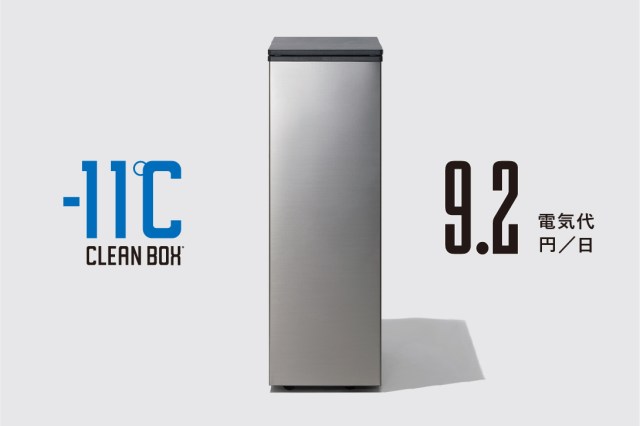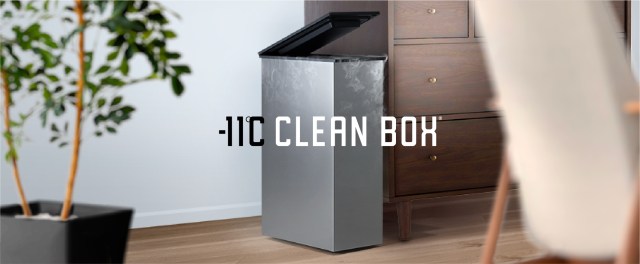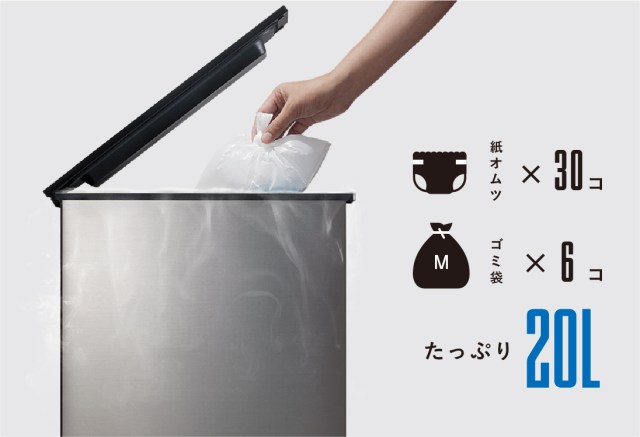Japanese company develops trash can that freezes garbage to prevent bad smells
soranews24.com
 Even dirty diapers are tamed by the unrelenting chill of Clean Box.
Even dirty diapers are tamed by the unrelenting chill of Clean Box.
As the sweltering summer hits Japan, a lot of unpleasant things come with it, from blisteringly dangerous heat to everyone’s least favorite houseguests, cockroaches.
But one other awful side-effect of summer is that garbage really starts to stink, especially in Japan were many people eat fresh fish on an almost daily basis.
Here to remedy some of these problems is Nakanishi Kinzoku Kogyo and their product the Clean Box. By blending the technology of a standard kitchen freezer with the highly sophisticated design of a rubbish bin, Clean Box can store your refuse, especially the organic stuff, at -11 degrees Celsius (12 degrees Fahrenheit) thus arresting the production of bacteria known to raise a stink.

That temperature might seem like an arbitrary homage to Spinal Tap, but surprisingly the cutoff for diapers to smell horrible is said to be -10 degrees, so lowering it by one degree provides added diaper protection while conserving power and wear on equipment.
Nakanishi Kinzoku Kogyo got the idea back in 2017 when they read people discussing putting garbage in their kitchen freezers to eliminate smells online.
That lifehack never really caught on because people weren’t crazy about putting dirty diapers next to their frozen peas, so the company decided that instead of putting garbage in freezers they could put a freezer inside a waste bin. A 2016 survey found that about one in five people have tried putting garbage in the fridge or freezer, and among them only about one and five continued to do so.
Clean Box’s development wasn’t without its challenges. Accommodations for air flow, coolant, and condensation needed to be made in a very compact space. The first limited run of 100 Clean Boxes were released in 2019 and sold out almost instantly, and in April of this year a crowdfunding campaign raised over 40 million yen in pledges. They can now be increasingly seen in major appliance stores around Japan with a price tag of 48,180 yen (US$358). Each Clean Box can hold 20 liters (4 gallons) and measures 69 by 23 by 44 centimeters (27 by 9 by 17 inches). The estimated energy bill to run one is about nine yen ($0.07) a day.
▼ 20 liters equates to about 30 diapers or six “medium” garbage bags.

Online comments were cautiously optimistic. They appreciated the idea of ridding homes of those horrible smells, but also expressed concerns about energy consumption and other potential pitfalls.
Although its not without its issues, the Clean Box has clearly shown itself to be in demand so far, and Nakanishi Kinzoku is currently looking to expand sales to hotter parts of the globe like Southeast Asia. They’d probably also do well with restaurants, who tend to have a lot of organic waste and a vested interest in not smelling like a dump.
So, it is possible that Clean Boxes might become a common sight before too long, but for those looking for a more low-tech method, the Tokyo Police have a neat idea.
soranews24.com

As the sweltering summer hits Japan, a lot of unpleasant things come with it, from blisteringly dangerous heat to everyone’s least favorite houseguests, cockroaches.
But one other awful side-effect of summer is that garbage really starts to stink, especially in Japan were many people eat fresh fish on an almost daily basis.
Here to remedy some of these problems is Nakanishi Kinzoku Kogyo and their product the Clean Box. By blending the technology of a standard kitchen freezer with the highly sophisticated design of a rubbish bin, Clean Box can store your refuse, especially the organic stuff, at -11 degrees Celsius (12 degrees Fahrenheit) thus arresting the production of bacteria known to raise a stink.

That temperature might seem like an arbitrary homage to Spinal Tap, but surprisingly the cutoff for diapers to smell horrible is said to be -10 degrees, so lowering it by one degree provides added diaper protection while conserving power and wear on equipment.
Nakanishi Kinzoku Kogyo got the idea back in 2017 when they read people discussing putting garbage in their kitchen freezers to eliminate smells online.
That lifehack never really caught on because people weren’t crazy about putting dirty diapers next to their frozen peas, so the company decided that instead of putting garbage in freezers they could put a freezer inside a waste bin. A 2016 survey found that about one in five people have tried putting garbage in the fridge or freezer, and among them only about one and five continued to do so.
Clean Box’s development wasn’t without its challenges. Accommodations for air flow, coolant, and condensation needed to be made in a very compact space. The first limited run of 100 Clean Boxes were released in 2019 and sold out almost instantly, and in April of this year a crowdfunding campaign raised over 40 million yen in pledges. They can now be increasingly seen in major appliance stores around Japan with a price tag of 48,180 yen (US$358). Each Clean Box can hold 20 liters (4 gallons) and measures 69 by 23 by 44 centimeters (27 by 9 by 17 inches). The estimated energy bill to run one is about nine yen ($0.07) a day.
▼ 20 liters equates to about 30 diapers or six “medium” garbage bags.

Online comments were cautiously optimistic. They appreciated the idea of ridding homes of those horrible smells, but also expressed concerns about energy consumption and other potential pitfalls.
“That’s a good idea.”
“Just putting it in the fridge is fine I think.”
“I normally put fruit and vegetable peels in a bag in the freezer…but I guess that wouldn’t work with diapers.”
“Maybe designing an odor-proof bag would be better so as not to use electricity?”
“I feel like YouTubers are going to do weird stuff with this thing.”
“But when you take the bag outside doesn’t the frost make it all wet? And would the bag be easier to break if frozen?”
“At that price, can’t you just buy a normal freezer and put garbage in it?”
“Why stop there? Let’s make them nuclear powered too!”
“I think 10,000 yen is probably a more reasonable price.”
Although its not without its issues, the Clean Box has clearly shown itself to be in demand so far, and Nakanishi Kinzoku is currently looking to expand sales to hotter parts of the globe like Southeast Asia. They’d probably also do well with restaurants, who tend to have a lot of organic waste and a vested interest in not smelling like a dump.
So, it is possible that Clean Boxes might become a common sight before too long, but for those looking for a more low-tech method, the Tokyo Police have a neat idea.
